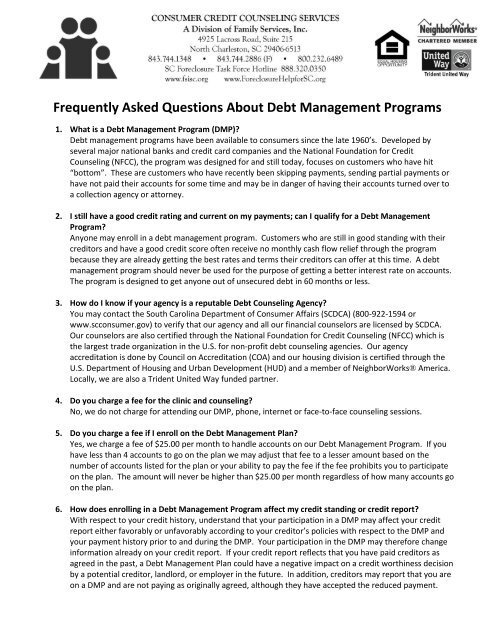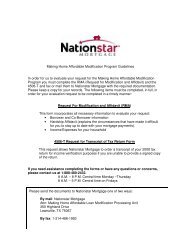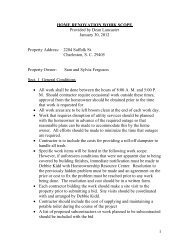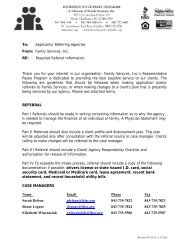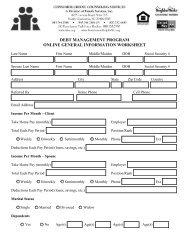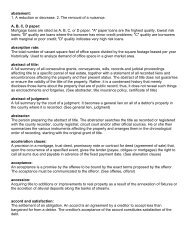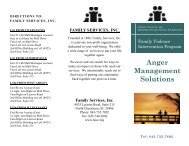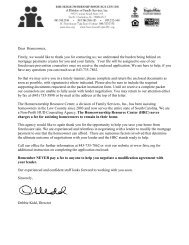Frequently Asked Questions About Debt Management Programs
Frequently Asked Questions About Debt Management Programs
Frequently Asked Questions About Debt Management Programs
You also want an ePaper? Increase the reach of your titles
YUMPU automatically turns print PDFs into web optimized ePapers that Google loves.
<strong>Frequently</strong> <strong>Asked</strong> <strong>Questions</strong> <strong>About</strong> <strong>Debt</strong> <strong>Management</strong> <strong>Programs</strong><br />
1. What is a <strong>Debt</strong> <strong>Management</strong> Program (DMP)?<br />
<strong>Debt</strong> management programs have been available to consumers since the late 1960’s. Developed by<br />
several major national banks and credit card companies and the National Foundation for Credit<br />
Counseling (NFCC), the program was designed for and still today, focuses on customers who have hit<br />
“bottom”. These are customers who have recently been skipping payments, sending partial payments or<br />
have not paid their accounts for some time and may be in danger of having their accounts turned over to<br />
a collection agency or attorney.<br />
2. I still have a good credit rating and current on my payments; can I qualify for a <strong>Debt</strong> <strong>Management</strong><br />
Program?<br />
Anyone may enroll in a debt management program. Customers who are still in good standing with their<br />
creditors and have a good credit score often receive no monthly cash flow relief through the program<br />
because they are already getting the best rates and terms their creditors can offer at this time. A debt<br />
management program should never be used for the purpose of getting a better interest rate on accounts.<br />
The program is designed to get anyone out of unsecured debt in 60 months or less.<br />
3. How do I know if your agency is a reputable <strong>Debt</strong> Counseling Agency?<br />
You may contact the South Carolina Department of Consumer Affairs (SCDCA) (800-922-1594 or<br />
www.scconsumer.gov) to verify that our agency and all our financial counselors are licensed by SCDCA.<br />
Our counselors are also certified through the National Foundation for Credit Counseling (NFCC) which is<br />
the largest trade organization in the U.S. for non-profit debt counseling agencies. Our agency<br />
accreditation is done by Council on Accreditation (COA) and our housing division is certified through the<br />
U.S. Department of Housing and Urban Development (HUD) and a member of NeighborWorks® America.<br />
Locally, we are also a Trident United Way funded partner.<br />
4. Do you charge a fee for the clinic and counseling?<br />
No, we do not charge for attending our DMP, phone, internet or face-to-face counseling sessions.<br />
5. Do you charge a fee if I enroll on the <strong>Debt</strong> <strong>Management</strong> Plan?<br />
Yes, we charge a fee of $25.00 per month to handle accounts on our <strong>Debt</strong> <strong>Management</strong> Program. If you<br />
have less than 4 accounts to go on the plan we may adjust that fee to a lesser amount based on the<br />
number of accounts listed for the plan or your ability to pay the fee if the fee prohibits you to participate<br />
on the plan. The amount will never be higher than $25.00 per month regardless of how many accounts go<br />
on the plan.<br />
6. How does enrolling in a <strong>Debt</strong> <strong>Management</strong> Program affect my credit standing or credit report?<br />
With respect to your credit history, understand that your participation in a DMP may affect your credit<br />
report either favorably or unfavorably according to your creditor’s policies with respect to the DMP and<br />
your payment history prior to and during the DMP. Your participation in the DMP may therefore change<br />
information already on your credit report. If your credit report reflects that you have paid creditors as<br />
agreed in the past, a <strong>Debt</strong> <strong>Management</strong> Plan could have a negative impact on a credit worthiness decision<br />
by a potential creditor, landlord, or employer in the future. In addition, creditors may report that you are<br />
on a DMP and are not paying as originally agreed, although they have accepted the reduced payment.
7. What types of accounts can the DMP help me with?<br />
Your <strong>Debt</strong> <strong>Management</strong> Program counselor can restructure payments for credit cards, unsecured<br />
personal loans (loans with no collateral attached to the loan) with national loan companies (One Main<br />
Financial, Beneficial, Springleaf Finance, etc. or unsecured personal loans with banks and credit unions).<br />
8. What types of accounts cannot go on a DMP?<br />
We cannot do payment arrangements for collection accounts, pay day loans and small local finance<br />
companies (Regional, Security, Commonwealth, Sunshine, etc.), mortgages, car loans or any type of loan<br />
that is secured. Your counselor can provide advice on how to handle these accounts on your own. We<br />
are not licensed to do settlements—contact the SC Dept of Consumer Affairs (800-922-1594) to find out if<br />
they have licensed ANY settlement company to do business in SC (most are scams).<br />
9. What information will my counselor need from me to get started?<br />
You will need to provide proof of income (pay check stub or bank statement showing deposits of income),<br />
a current statement for each of the accounts you need assistance with and a budget including all living<br />
expenses (rent/mortgage, food, car payments, utilities, etc).<br />
10. I do not get statements from my creditors any more. What does this mean and can I still enroll on the<br />
plan?<br />
If you are no longer receiving statements from your creditors and have not been making payments then<br />
your accounts are most likely in collections. Unfortunately we cannot work with accounts in collections.<br />
We encourage you to get a free copy of your credit report from each of the 3 major reporting agencies<br />
(Equifax, Experian, and TransUnion). You can download them or get a request form from the Federal<br />
Trade Commissions website-www.annualcreditreport.com. This is the only program sponsored by the<br />
Federal government who states everyone is entitled to get a one free credit report once a year from all 3<br />
of the bureaus. These reports do not include credit scores. Unfortunately you still have to pay to get your<br />
credit scores. They can be obtained from www.myfico.com.<br />
11. Will my counselor contact my creditors?<br />
We do not contact any creditors until you have enrolled and made your first payment on the plan. At<br />
that time letters are sent to each of your creditors asking them to enroll you on the plan. This letter<br />
advises your creditors that you have applied for debt relief assistance through our DMP and request the<br />
creditor’s support and cooperation. The letter also states the proposed payment amount and<br />
disbursement date. Our agency will also send you a monthly statement reflecting the previous months’<br />
transactions. We will also send you balance verification letters when our CCCS computer program detects<br />
that you have an account that will pay off in 3 months based on the balance we are showing. Your<br />
statements from your creditors are the correct balances. We need you to send your statements to us to<br />
compare balances—this is the only way we can be sure not to over pay or under pay an account when it<br />
is near being paid in full.
12. Will all of my creditors accept the plan?<br />
Your acceptance on the plan is on a case by case basis with your creditors. All the major creditors provide<br />
a formula to debt counseling agencies that calculates the payment amount they will accept on the plan<br />
based on your current balance. They also provide your counselor with information on what they will do<br />
with your interest rates while on the plan. The only time they reject a plan offer is if the balance is higher<br />
than you stated (they will request that you bump up the payment to the required amount and your<br />
counselor will send them a new letter requesting them to accept that amount) or if your account has<br />
already been charged off or turned over to a collection agency.<br />
Also, it is important to note that creditors review your budget and income information while making these<br />
determinations. If you are showing that you are in the negative after living expenses and program<br />
payment, they will want an explanation from your counselor as to how you are going to be able to afford<br />
doing the program (increased hours at work, savings, raise at work, overtime pay, new job, part-time job,<br />
cutting back on living expenses and/or financial support from family are acceptable explanations).<br />
13. What happens if the plan is still too expensive for me to use?<br />
Your counselor, based on your situation, may make other suggestions on how to handle your debts at this<br />
time. They also will advise you of your rights as a consumer in South Carolina and what actions your<br />
creditors can take against you if you cannot pay them or pay less than the amounts requested. Your<br />
counselor may also refer you out to seek legal advice from a bankruptcy attorney.<br />
14. Will creditors still call me when I enroll on the plan?<br />
During the first 90 days of your DMP, creditors may still call you. Do not refuse to talk to them.<br />
Remember, getting out of debt involves the cooperative efforts of your creditors, CCCS and you. Ask your<br />
creditors to contact your counselor at CCCS. If a creditor indicates that they will not work with a DMP, call<br />
our office immediately. Most creditors require 3 consecutive payments before this activity will stop.<br />
15. Will creditors stop charging interest on my accounts while on the DMP?<br />
Very few creditors these days stop all interest for clients on a DMP. Your counselor in most instances can<br />
tell you what the new interest rate will be based on your creditors’ information for DMP enrollment.<br />
16. Will I still get statements from my creditors while on the DMP?<br />
Yes! Your creditors will send you a statement each month just as they always have done in the past. Your<br />
counselor will require you to send the most recent set of statements to them so they can monitor what<br />
your creditors are doing on your accounts. In between turning in your statements if you notice any<br />
changes (such as interest rate has gone back up or no payment if reflected for the month) you should<br />
contact your counselor immediately so they can find out what is going on. Failure to keep your counselor<br />
updated by not sending in your statements can cause severe problems if an issue is not caught early on.<br />
Check all your monthly statements.
17. When will my payments be due for the DMP if I enroll?<br />
Our agency has two enrollment dates for each month. The 3 rd or 16 th are the due dates for payments on<br />
the DMP. You must select one of those dates to use the whole time you are on the DMP. Once selected<br />
you cannot change the due date as it would upset the arrangements that have already been made with<br />
your creditors. All payments are due by 5:00 P. M. on the due date you have selected to use. If your due<br />
date falls on a weekend or holiday, you have until the next business day to turn in your payment and it<br />
will be counted as on time.<br />
18. Will CCCS accept my personal check or cash?<br />
NO! PAYMENTS MUST BE MADE WITH A MONEY ORDER OR CASHIER’S CHECK. Personal checks will be<br />
returned to you, which delays sending payments to your creditors. Be sure to keep the carbon copy of<br />
your money order or cashier’s check in a safe place. CCCS offers an ACH (automated debit system) once<br />
you have made your second payment via money order or cashier’s check. Contact your counselor for<br />
more information on using ACH to submit your payment to CCCS.<br />
19. To whom do I make my money order or cashier’s check payable?<br />
Make payable to “CCCS” or “Consumer Credit Counseling Services”. Make sure your name is legible and<br />
include the client ID# issued to you. If someone else is turning in your payment on your behalf, be sure<br />
they understand to put YOUR name on the money order or cashier’s check and not theirs. If some of the<br />
accounts on your plan are business accounts, do not put YOUR company business name on your money<br />
order or bank cashier’s check. Always use your personal name and client ID# issued to you for the plan.<br />
20. What happens if my payment is late or less than the full amount?<br />
Certain circumstances do arise. Call your counselor if you are experiencing problems with your monthly<br />
payments. If your payment is late or less than the agreed upon amount accepted by your creditors, it may<br />
remain in your account until we run checks again (approximately 10 days later). In addition, your<br />
creditors could drop you from the plan and reinstate a higher interest rate and late fees. Partial payments<br />
from you will be paid proportionately to your creditors based on the amount that was received<br />
(remember creditors view partial payments as not making a payment at all and will hit you with a late<br />
fee even if the partial payment is received by the due date requested and could result in you being<br />
dropped from the program by your creditors).<br />
21. Can I drop out of the program voluntarily and if I do what happens?<br />
<strong>Debt</strong> <strong>Management</strong> Plans are not legal binding contracts. It is a voluntary program between you, our<br />
counseling agency and your creditors. Any party can elect to drop out of the plan at any time. We<br />
encourage you to finish your program to the end but understand that some clients for various reasons<br />
may need to or elect to drop the program. We require that you contact us in writing stating that you wish<br />
to terminate your program. If you are using the auto draft (ACH) for payments you must give us a 2 week<br />
notice in writing before the next draft date to prevent the draft from going through. Once you have<br />
notified us, we then notify your remaining creditors on the plan that you have elected to take over your<br />
accounts on your own again. Please remember that at this point your creditors can put your interest<br />
rate back to what it was prior to enrollment, which may cause your minimum payments to go back up.
22. What happens once I have paid off all my accounts and the plan is complete?<br />
We notify your creditors that you have successfully completed the program. They begin to solicit you<br />
again at that time to re-establish credit with them. We caution our clients to be very careful about getting<br />
credit cards going forward so that they do not find themselves back in debt troubles again.<br />
23. Is there any other reason(s) my program could be terminated by your agency or my creditors?<br />
If you miss 3 consecutive payments and do not contact our offices after receiving our missed payment<br />
letters sent to you, we will close your file and notify your creditors that you were dropped for Non-<br />
Payment and that they are to contact you directly at this point for payment. Creditors retain the right to<br />
drop you from the program for one missed payment and many will not give you a second chance to reenroll<br />
in the <strong>Debt</strong> <strong>Management</strong> Program.<br />
24. How can I receive referral information for other services offered by other non-profit organizations or<br />
local and federal assistance programs?<br />
You can find a referral List on our website www.fsisc.org, or you may contact us to have one mailed to<br />
you at 843-735-7802 or Toll Free 800-232-6489, Ext. 7802.


